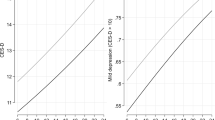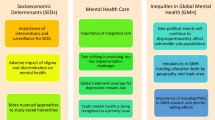Abstract
Mental, neurological and substance-use (MNS) disorders comprise approximately 13% of the global burden of disease. The Grand Challenges in Global Mental Health Initiative has recently identified research priorities for the next decade to address prevention and treatment of MNS disorders. One main research priority is to identify the root causes, risks and protective factors associated with global mental health. Recent advances in cultural neuroscience have identified theoretical, methodological, and empirical methods of identifying biomarkers associated with mental health disorders across nations. Here we review empirical research in cultural neuroscience that address meeting the grand challenges in global mental health.
Similar content being viewed by others
Notes
Supplementary Information can be found at: http://www.nature.com/nature/journal/v475/n7354/extref/475027a-s1.pdf.
References
Baltes, P. B. (1997). On the incomplete architecture of human ontogeny: Selection, optimization and compensation as foundation of developmental theory. American Psychologist, 52, 366–380.
Baltes, P. B., Reuter-Lorenz, P. A., & Rösler, F. (2006). Lifespan development and the brain: The perspective of biocultural co-constructivism. Cambridge: Cambridge University Press.
Beddington, J., Cooper, C. L., Field, J., Goswami, U., Huppert, F. A., Jenkins, R., et al. (2008). The mental wealth of nations. Nature, 455(7216), 1057–1060.
Berry, J. W. (1997). Immigration, acculturation and adaptation. Applied Psychology, 46(1), 5–68.
Brickman, A. M., Cabo, R., & Manly, J. J. (2006). Ethical issues in cross-cultural neuropsychology. Applied Neuropsychology, 13(2), 91–100.
Carstensen, L. L., & Turk-Charles, S. (1994). The salience of emotion across the adult lifespan. Psychology and Aging, 9, 259–264.
Cheon, B. K., Im, D. M., Harada, T., Kim, J. S., Mathur, V. A., Scimeca, J. M., et al. (2011). Cultural influences on neural basis of intergroup empathy. Neuroimage, 57(2), 642–650.
Cheon, B. K., Livingston, R. W., Hong, Y. Y., & Chiao, J. Y. (2014). Gene x environment interaction on intergroup bias: The role of 5-HTTLPR and perceived outgroup threat. Social Cognitive and Affective Neuroscience, 9(9), 1268–1275.
Chiao, J. Y., & Ambady, N. (2007). Cultural neuroscience: Parsing universality and diversity across levels of analysis. In S. Kitayama & D. Cohen (Eds.), Handbook of cultural psychology (pp. 237–254). New York: Guilford Press.
Chiao, J. Y., Cheon, B. K., Pornpattananangkul, N., Mrazek, A. J., & Blizinsky, K. D. (2013). Cultural neuroscience: Progress and promise. Psychological Inquiry, 24(1), 1–19.
Chiao, J. Y., Harada, T., Komeda, H., Li, Z., Mano, Y., Saito, D., et al. (2009). Neural basis of individualistic and collectivistic views of self. Human Brain Mapping, 30(9), 2813–2820.
Chiao, J. Y., Iidaka, T., Gordon, H. L., Nogawa, J., Bar, M., Aminoff, E., et al. (2008). Cultural specificity in amygdala response to fear faces. Journal of Cognitive Neuroscience, 20(12), 2167–2174.
Chiao, J. Y., Li, S. C., Seligman, R., & Turner, R. (Eds.). (2016). Oxford handbook of cultural neuroscience. New York: Oxford University Press.
Collins, P. Y., Patel, V., Joestl, S. S., March, D., Insel, T. R., Daar, A. S., et al. (2011). Grand challenges in global mental health. Nature, 475(7354), 27–30.
Domínguez, D. J. F., Lewis, E. D., Turner, R., & Egan, G. F. (2009). The brain in culture and culture in the brain: A review of core issues in neuroanthropology. Progress in Brain Research, 178, 43–64.
Goh, J. O., Chee, M. W., Tan, J. C., Venkatraman, V., Hebrank, A., Leshikar, E. D., et al. (2007). Age and culture modulate object processing and object-scene binding in the ventral visual area. Cognitive, Affective and Behavioral Neuroscience, 7(1), 44–52.
Han, S., & Northoff, G. (2008). Culture-sensitive neural substrates of human cognition: a transcultural neuroimaging approach. Nature Reviews Neuroscience, 9, 646–654.
Han, S., Northoff, G., Vogeley, K., Wexler, B. E., Kitayama, S., & Varnum, M. E. W. (2013). A cultural neuroscience approach to the biosocial nature of the human brain. Annual Review of Psychology, 64, 335–359.
Heckhausen, J., Worsch, C., & Schulz, R. (2010). A motivational theory of life-span development. Psychological Review, 117, 32–60.
Kim, H. S., & Sasaki, J. Y. (2012). Emotion regulation: The interplay of culture and genes. Social and Personality Psychology Compass, 6, 865–877.
Kim, H. S., & Sasaki, J. Y. (2014). Cultural neuroscience: Biology of the mind in cultural contexts. Annual Review of Psychology, 65, 487–514.
Kim, H. S., Sherman, D. K., Sasaki, J. Y., Xu, J., Chu, T. Q., Ryu, C., et al. (2010). Culture, distress, and oxytocin receptor polymorphism (OXTR) interact to influence emotional support seeking. Proceedings of the National Academy of Sciences USA, 107(36), 15717–15721.
Kitayama, S., & Uskul, A. K. (2011). Culture, mind and the brain: Current evidence and future directions. Annual Review of Psychology, 62, 419–449.
Lahat, A., Todd, R. M., Mahy, C. E., Lau, K., & Zelazo, P. D. (2010). Neurophysiological correlates of executive function: a comparison of European-Canadian and Chinese-Canadian 5-year-old children. Frontiers of Human Neuroscience, 3, 72.
Li, S. C. (2003). Biocultural orchestration of developmental plasticity across levels: The interplay of biology and culture in shaping the mind and behavior across the life span. Psychological Bulletin, 129(2), 171–194.
Li, S.-C., Lindenberger, U., Hommel, B., Aschersleben, G., Prinz, W., & Balest, P. B. (2004). Transformations in the couplings among intellectual abilities and constituent cognitive processes across the life span. Psychological Science, 15, 155–163.
Losin, E. A., Cross, K. A., Iacoboni, M., & Dapretto, M. (2014). Neural processing of race during imitation: Self-similarity versus social status. Human Brain Mapping, 35(4), 1723–1739.
Manly, J. J. (2008). Critical issues in cultural neuropsychology: profit from diversity. Neuropsychological Review, 18(3), 179–183.
Manly, J. J., Byrd, D. A., Touradji, P., & Stern, Y. (2004). Acculturation, reading level, and neuropsychological test performance among African-American elders. Applied Neuropsychology, 11(1), 37–46.
Mathur, V. A., Harada, T., & Chiao, J. Y. (2012). Racial identification modulates default network activity for same and other races. Human Brain Mapping, 33(8), 1883–1893.
Murata, A., Moser, J. S., & Kitayama, S. (2013). Culture shapes electrocortical responses during emotion suppression. Social Cognitive and Affective Neuroscience, 8(5), 595–601.
Park, D. C., & Gutchess, A. H. (2002). Aging, cognition, and culture: A neuroscientific perspective. Neuroscience and Biobehavioral Review, 26(7), 859–867.
Sasaki, J. Y., Le Clair, J., West, A., & Kim, H. S. (2016). The gene-culture interaction framework and implications for health. In J. Y. Chiao, S.-C. Li, R. Seligman, & R. Turner (Eds.), Oxford handbook of cultural neuroscience (pp. 279–297). New York: Oxford University Press.
Telzer, E. H., Masten, C. L., Berkman, E. T., Lieberman, M. D., & Fuligni, A. J. (2010). Gaining while giving: An fMRI study of the rewards of family assistance among white and Latino youth. Social Neuroscience, 5(5–6), 508–518.
Turner, R., & Whitehead, C. (2008). How collective representations can change the structure of the brain. Journal of Consciousness Studies, 15, 43–57.
Yang, L. H., Kleinman, A., Link, B. G., Phelan, J. D., Lee, S., & Good, B. (2007). Culture and stigma: Adding moral experience to stigma theory. Social Science and Medicine, 64(7), 1524–1535.
Zhu, Y., Zhang, L., Fan, J., & Han, S. (2007). Neural basis of cultural influence on self-representation. Neuroimage, 34(3), 1310–1316.
Acknowledgements
The authors thank Pamela Y. Collins for review and edits of the manuscript. Research reported in this publication was supported by the National Institutes of Health under award number R13DA33065. The content is solely the responsibility of the authors and does not necessarily represent the official views of the National Institutes of Health.
Author Contributions
J.Y.C., S.-C.L. and R.T. are members of the International Cultural Neuroscience Consortium and S.-Y. L.-T. and B.A.P. are members of the Office for Research on Disparities and Global Mental Health at NIH. They contributed substantially to the conceptualization and implementation of the writing of the manuscript. All co-authors conceptualized and co-wrote drafts of the manuscript. Chiao led the revision of the manuscript drafts and coordinated all correspondence with the co-authors. Chiao, Li and Turner were the correspondents with Culture and Brain. Pringle and Lee-Tauler obtained clearance for the final manuscript from the Office of Science Policy, Planning and Communications at NIMH.
Author information
Authors and Affiliations
Corresponding author
Rights and permissions
About this article
Cite this article
Chiao, J.Y., Li, SC., Turner, R. et al. Cultural neuroscience and global mental health: addressing grand challenges. Cult. Brain 5, 4–13 (2017). https://doi.org/10.1007/s40167-016-0045-4
Accepted:
Published:
Issue Date:
DOI: https://doi.org/10.1007/s40167-016-0045-4




